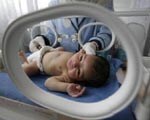Babies who are marginally low-birth-weight are at risk of iron deficiency, and should get iron supplements.

Full-term, healthy babies born to well-nourished mothers have adequate stores of iron in their bodies to carry them through their first 6 months of life. For this reason, they can thrive on breast milk, which contains very little iron, and then begin eating iron-rich solid foods at 6 months of age. But smaller babies have lower reserves and need to start iron supplementation earlier. Low birth weight (LBW) infants (<2500 g) are at risk for early iron deficiency, which is associated with poor neurologic development. Moreover, the proportion of infants with marginally LBW (from 2000 to 2500 g) is increasing. The World Health Organization and the American Academy of Pediatrics recommend iron supplements for all LBW infants, without distinguishing between extremely LBW (<1000 g) and MLBW infants. There is a striking lack of data about possible benefits and risks of iron supplementation in MLBW infants, who represent more than 60% of all LBW infants. The aim of this study was to investigate the short-term laboratory and functional effects of such supplementation in this population.
To investigate the effects of iron supplementation, researchers randomly assigned 285 Swedish healthy, marginally low-birth-weight babies to receive 1 of 3 iron supplement doses - 0 (placebo), 1, or 2 mg of iron/kg of body weight per day from the age of 6 weeks to 6 months.
At six months, it was found that 36 percent of children in the placebo group were iron deficient, compared to only 8 percent of the 1-mg/kg group and 4 percent of the 2-mg/kg group. More severe deficiency, or anaemia, was seen in 10 percent of the placebo group, 3 percent of the 1-mg/kg group, and none of the children in the 2-mg/kg group. Eighteen percent of the exclusively breastfed babies in the placebo group had iron deficiency anaemia. No adverse effects of iron supplementation were found in any of the infants.
The study shows that iron supplements reduce the risk of developing iron deficiency anemia in marginally low birth weight infants with no adverse effects.
DoctorNDTV is the one stop site for all your health needs providing the most credible health information, health news and tips with expert advice on healthy living, diet plans, informative videos etc. You can get the most relevant and accurate info you need about health problems like diabetes, cancer, pregnancy, HIV and AIDS, weight loss and many other lifestyle diseases. We have a panel of over 350 experts who help us develop content by giving their valuable inputs and bringing to us the latest in the world of healthcare.












